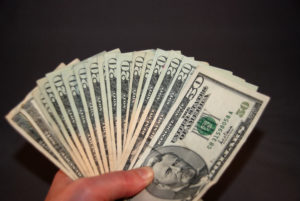Rewards Credit Cards Earn Extra Money
If you’ve read even a few of the previous posts in my blog, I’m sure you’ve noticed there are several concepts I advocate almost constantly. Living on a budget, planning for your future, saving, and living debt free are among them. I’ve also said I use rewards credit cards. That last may make you go, “What???!” So, how does using a credit card fit with living debt free and being frugal?
I’ll address the last part of that question first: A major tenet of frugality is maximizing resources. Money is a major resource; you have to make it work
for you. To keep your expenses minimal you can budget and plan your purchases. You can put money into savings (maybe earning a bit in interest), or you can invest (which has the potential to earn more). But…if we’re honest with ourselves, we know a lot of our money (maybe most of it) goes for living now. So, are those funds gone—the profit from them being solely today’s dinner or fuel for the car? Or is there some way to get a financial return on them?
One of my favorite ways to gain a little extra money is to use cash back rewards credit cards.
Cash back rewards credit cards.
Quite a few banks offer credit cards with some type of cashback reward on purchases made with the rewards credit cards. All the programs I’ve seen are percentage based, but that percentage varies by card as do some conditions for claiming the reward. Here are a few examples of those conditions: The cashback may be paid automatically, or you could have to request it: It could be that you need to accrue a minimum amount before payment is made, or perhaps there is a maximum you can receive: Every purchase may count towards the reward or only those on a predetermined list. There can be a number of stipulations. Before you apply for rewards credit cards do some research to find one that has “generous” terms.
It may not be (and most certainly shouldn’t be) the only consideration, but many people only look for a card that pays a large percentage. I’ve seen a seen a spread of cards offering between 1% and 5%. Regardless your card’s reward percentage, when you compare it to what you have to spend to earn it, your cash back probably won’t seem to be a huge amount of money. But. In a frugal life every dollar helps.
Some rewards credit cards have an annual fee avoid them.
Look at this
Let’s say your cost of living is $19,000 a year. I think you’ll agree that it is unlikely that anyone lives extravagantly on $19,000, but think what could be done if a person living on that amount was able to charge everything on cash back rewards credit cards that paid 1.5% on every purchase. That $19,000 would earn $285.00 in a year. Think what could be done with that money. That amount probably falls somewhere between half and a full month’s rent after charging $19,000. It would certainly be more than two week’s worth of groceries.
Now, consider what a frugal person with a greater cost of living—definitely living on a budget, but still charging everything to cash back rewards credit cards—could do with their return. It could be added to an emergency fund, added to an investment account, or used towards making “a dream” become reality. (And, I’m not saying that the person living on $19,000 couldn’t to these things also. The amount of money we make doesn’t always dictate how tight our budgets are.) When I consider how that little bit of a return can be applied, I appreciate it more.
Be careful
In case anyone is wondering, that cash back “reward” is given because the purchase was made with that card rather than some other form of payment, and of course the program really wasn’t designed to benefit the purchasers all that much. Its real purpose is to promote loyalty and increase use.
Keeping that in mind, I want you to think about something else: Cash back rewards credit cards rarely charge low interest rates on owed balances. They typically charge between 13% and 33% APR (annual percentage rate), compounded daily. That compounded daily is important. It means that when you carry a balance on your card a small amount of interest is added to that balance every day, and each day’s calculation is based on the previous day’s new total owed.
This an example of how interest works
Here’s a somewhat simplified example: You make a $1000 charge on your credit card. Your APR is 23% compounded daily. (23% is an average of the interest spread I just gave you.)
1) Find the interest percentage charged daily: .23/365=0.000630137, approximately
0.063%
2) Find the amount of interest charged on your $1000 the first day:
1000 x .00063=.63
The total you owe at the end of the first day is $1000.63
3) Find the amount of interest charged the second day on your new balance of
$1000.63: 1000.63 x .00063=.630399. For simplicity, round this to .63
(63 cents). Your new balance is $1001.26
4) New balance after interest is added in on the third day: $1001.89
5) Fourth day: $1002.57 Fifth day: $1003.20 Sixth day: $1003.83
Seventh day: $1004.43 Eight day: $1005.03
By the end of the eighth day more that $5 will have been added to your balance and you know as well as I do that eventually the daily interest will amount to more than 63 cents. And yes, you will be making monthly payments against your balance, but if you make only the minimum payments it will take you years to pay it off the balance.
As I said above, this is a simplified example. Among other things credit card companies might not round the interest figure until your billing date, or if too little interest is accrued, a minimum charge can be imposed. And, I’m sure you can see that however nice it is to get cash back rewards, interest charges more that negate the benefit.
Back to those fractions of a cent that I rounded away. As I just said the rounding might not happen until it’s time for your bill to be sent. As the month progresses they could accumulate and become real money. Depending on what percentage of a cent they amount to at that time, they could be rounded up rather than down—granted when that happens, it will only make a penny’s difference in the amount of interest you’ll pay. But here’s what I want you to know: If you have any type of interest bearing account (one that pays you interest) with an APR that is compounded daily, when it is time to credit the interest to your account the financial institution keeps that fraction of a cent for themselves. That doesn’t sound like a big deal, does it? No… not until you realize how many people have similar accounts with them; they make a fortune off those small fractions of a penny.)
Good News
Credit card debt is discomforting and inconvenient. There is, however, one great positive—a grace period (usually, of about 30 days). If you pay off your balance before the billing date, none of those interest or minimum finance charges apply (but any yearly fees for having the card would. It’s best to avoid cards that have that charge.) The key to successfully making money is to carry a zero balance.
Be responsible
My blog is dedicated to the frugal lifestyle. So, exactly what is frugal? A short definition is “the planned and enterprising use of your resources to
provide a lifestyle that you can enjoy now and in the future.” Take a look at my post being frugal. Being frugal requires a consistent mindset and constant practice. You really can’t be frugal part time.
I write about financial topics I study and my experiences (and those of others) in developing a frugal lifestyle. This includes experiments, both successful and unsuccessful. And I need to say that just because something works for me does not mean it would be a good move for you. For example, I’ve written about saving money on car insurance. But, if you don’t have a car, it’s very unlikely you need that kind of insurance. In your case having car insurance would be contrary to being frugal.
Being frugal in very individualized, and as each of us puts together a plan, we have to take into consideration our strengths and weaknesses. I’ve spent most of this post talking about use a cash back rewards credit card to recoup some money from what we spend. Now, I want to reiterate a caution: If you have a history of misusing credit, this plan may not be good for you. Paying off all charges before your billing date is imperative; interest charges are much more than the “reward” you receive for using the card to make your purchases. If it is likely you would accrue interest, this plan is counterproductive. If, however, you can be certain you’ll carry a zero balance, it may be a good tactic to incorporate into your frugal lifestyle. Yes rewards credit cards can be a good move if you pay the balance off before you are charged interest. Personally i pay my rewards card off every day.
Conclusion
The one consistency of my blog is that is promotes earning more, saving more, and living better. If you carry a zero balance, the use of cashback rewards credit cards to pay for the things your life requires can be a tool for achieving those goals.



